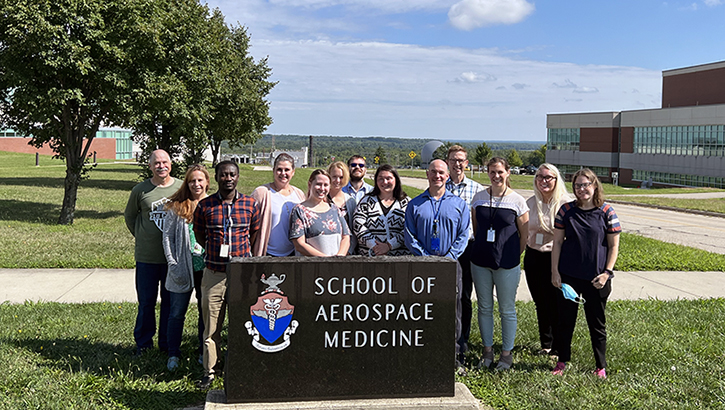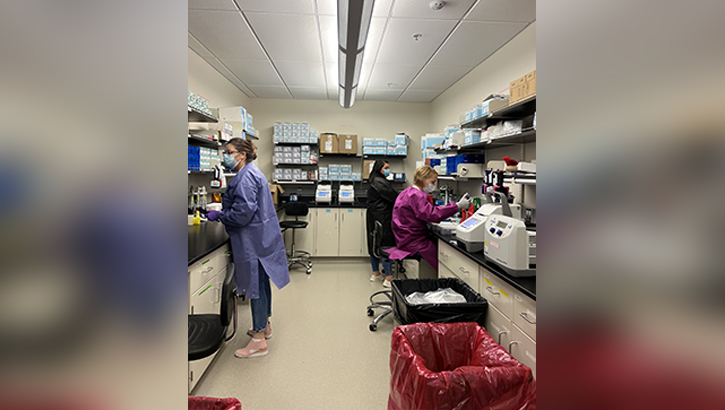Genome Sequencing Work at U.S. Air Force School of Aerospace Medicine
 A group stands outside the 711th Human Performance Wing’s U.S. Air Force School of Aerospace Medicine, or USAFSAM, at Wright-Patterson Air Force Base, Ohio, Aug. 15, 2022. The individuals represent the USAFSAM Public Health and Preventive Medicine Department including epidemiologists, laboratorians, and programmatic support that provided SARS-CoV-2 sequencing support to the Department of Defense in response to the coronavirus. (Credit: Dr. Anthony Fries)
A group stands outside the 711th Human Performance Wing’s U.S. Air Force School of Aerospace Medicine, or USAFSAM, at Wright-Patterson Air Force Base, Ohio, Aug. 15, 2022. The individuals represent the USAFSAM Public Health and Preventive Medicine Department including epidemiologists, laboratorians, and programmatic support that provided SARS-CoV-2 sequencing support to the Department of Defense in response to the coronavirus. (Credit: Dr. Anthony Fries)
Editor’s note: This is the seventh article in a 7-part series that highlights the work of technicians and scientists working in Military Health System laboratories who worked to identify COVID-19 variants using special sequencing technology.
The U.S. Air Force School of Aerospace Medicine, part of the Air Force Research Laboratory’s 711 Human Performance Wing at Wright-Patterson Air Force Base, Ohio, oversees the Department of Defense’s Global Respiratory Pathogen Surveillance Program. This program has a unique reach across the Military Health System and secures biological samples for sequencing from an incredibly expansive geographic footprint across the globe.
“The approach of the program is to capture a representative set of samples from MHS patients who show up each week to their health care provider with respiratory illness, such as COVID-19 and influenza,” said Dr. Anthony Fries, principal lead for the program at USAFSAM.
During the COVID-19 pandemic, the program was essential in fostering communication among the partner laboratories, securing funding, and championing the need for genomic surveillance in the DOD, which was exemplified by their shepherding of the DOD SARS-CoV-2 Whole Genome Sequencing Action Plan.
 From left: Laboratory technologists Carol Garrett, KelseyLanter, and Jennifer Meyer prepare specimens for sequencing analyses in the 711th Human Performance Wing’s U.S. Air Force School of Aerospace MedicinePublic Health Department at Wright-Patterson Air Force Base, Ohio, Aug. 15,2022. The 711th Human Performance Wing is part of the Air Force ResearchLaboratory, the primary scientific research and development center for theDepartment of the Air Force.
From left: Laboratory technologists Carol Garrett, KelseyLanter, and Jennifer Meyer prepare specimens for sequencing analyses in the 711th Human Performance Wing’s U.S. Air Force School of Aerospace MedicinePublic Health Department at Wright-Patterson Air Force Base, Ohio, Aug. 15,2022. The 711th Human Performance Wing is part of the Air Force ResearchLaboratory, the primary scientific research and development center for theDepartment of the Air Force.
USAFSAM has sequenced over 15,000 SARS-CoV-2 samples, the majority within DOD partner labs, and consistently had less than 14-day turn-around times for sample processing. Their unique access to samples from MHS populations throughout the United States and around the world has greatly aided ongoing surveillance of novel SARS-CoV-2 variants for the DOD. USAFSAM data are shared weekly with international databases where they are immediately interpreted and MHS beneficiary data are placed in context with the SARS-CoV-2 genomic data coming out from every corner of the globe.
“USAFSAM produces numerous reports and visualizations to aid public health personnel in interpreting the constantly changing SARS-CoV-2 variant landscape. USAFSAM has an extensive history of genomic surveillance for other viruses like influenza. However, the sequencing response and raw amount of data produced for SARS-CoV-2 has been a tectonic shift for public health,” said Fries.
“The daily amount of sequences produced across the globe allows scientists to churn through these data in near-real time as the virus is evolving and new variants emerge,” said Fries.